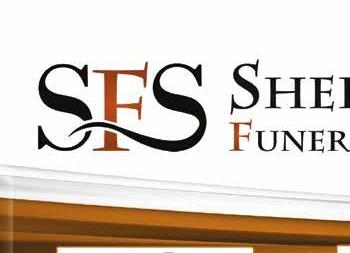
7 minute read
Dr Bill Webster - Professionals don’t grieve, do they?
by Inhouse
Professionals Don’t Grieve, Do They?
By Dr Bill Webster
Advertisement
I could hardly believe my ears!
I attended the funeral service of the wife of a funeral director I have known and respected for many years. It was, as you would expect, a beautiful tribute and an expertly conducted ceremony. My friend directed the service with grace and dignity that rose above the grief we all knew he was experiencing in the loss of someone he greatly loved and who would be terribly missed. Afterwards I commended him on how well the service had gone and he bravely and very professionally thanked me as we shared a few words. But as I stood among the large crowd in attendance, I overheard something that shocked me. “Well,” someone was saying, “he’s really handling this so well. But there again, he’s a funeral director, right, so he’s used to it.” There seems to be a perception “out there” that funeral professionals, first responders, police and fire officers, doctors and medical people, and others who “see this all the time” are somehow going to maintain professional composure and deal with personal situations with the same resources as they handle their professional responsibilities. So, how’s that working for you? Some weeks later, as I sat at lunch with my friend, it was obvious that it wasn’t working and he was struggling through, as he described it, “that dark place”. And I could relate, because after the death of my son, the reaction of many was because I was a grief counselor and understood the theory, I would be better equipped to deal with my personal grief and just get on. Why does this perception exist? I think there are several reasons: 1. People are impressed when, in some of the most difficult moments of their lives, they can count on someone to “take charge”, to “pull things together” when they are falling apart. We could give countless illustrations of how this opinion could be formed in situations involving those trained to respond with strength and objectivity as they assist people at critical times. That, after all, is their job. So when tragedy or crisis personally affects that professional, the perception is they will respond with similar fortitude as they do in their job. Obviously, it should go without saying that this is a myth, and I hardly need explain why. But as we try to understand WHY people buy into it, I suggest they might feel threatened when someone who has always shown strength and composure seemingly “loses it”, wondering what hope is there for them if a professional falls apart? Most people would rather not go there! 2. But flip the coin! I suggest that we as professionals are affected by the same myth. Experience has taught us how to maintain our composure and objectivity while at the same time showing empathetic understanding for our clients.
After all, this is not about US, it is about THEM. But that is just the point. When a personal loss occurs, it IS about us. But perhaps we quickly dismiss it as nothing to worry about, thinking to ourselves, “I’ve dealt with this stuff before.” If I have learned one thing in this past year it is this. Being an expert in grief, crisis or tragedy does not prepare you for when it happens to you. It is one thing to know it in theory, but it is quite another to experience it. Most of us understand the difference between Grief and Mourning. Grief is how we FEEL after a loss; mourning is how we EXPRESS those feelings. And there in a nutshell is the problem. After any significant loss, someone can feel like their heart is breaking, but when people ask us how we are, we say “I’m doing fine”. So the dilemma is “Where does the bereaved FD, or grief counselor, or other professionals go to express their grief?” are reluctant to go to colleagues, because we have an investment in appearing to be “doing well”. Besides, we rationalize, what can they tell us that we don’t know already, and that may be so! So what can you do if you are concerned about a grieving colleague? Keep it simple. They probably appreciate friendship more than “counsel”. Take them to lunch. Sit face to face and ask them whether they would like talk about their experience. Reassure then that it is OK not to be OK. Call every now and then to let them know you are thinking about them. Be there for them especially on those difficult days, personally or professionally. Make specific offers of support rather than generalities like “If there’s anything I can do.” Above all, LISTEN. Don’t dispense advice. Remind yourself, as William Shakespeare wrote, “Everyone can master a grief that is not his own.”
First you hurt, then you heal
Dr. Bill Webster understands grief not just in theory, but also from personal experience. In his book, “First you Hurt, Then you Heal”, Dr. Bill outlines a road map for the grief journey in a series of articles that take us through the process .
He begins with a chapter entitled “I Didn’t Plan for This” that gives people an understanding of what they may experience in the early days after a loss. The book then goes on to give us an understanding of grief, some insights into various situations of loss, and some strategies to help us work through the process.
This book will be a helpful resource for those who are going through a grief process as well as containing much relevant and practical information for those who would like to know what they can say and how they can help someone who has experienced a significant loss. It will also serve as a basic knowledge and layman’s guide for those in the helping professions such as nurses, teachers, funeral directors and those who seek to support grieving people, young and old, through their work. “First you Hurt, Then you Heal” provides practical, down to earth and effective insight into one of the most difficult topics and most misunderstood experiences of life.
First you Hurt, Then you Heal: A Road Map for the Grief Journey (Kindle Edition) is avaialble to buy on Amazon.





Representing the needs of almost 4,000 funeral homes, the National Association of Funeral Directors is the “Voice of the Funeral Profession”, supporting members and assuring the public of high standards for more than 100 years.


The NAFD is influential
• Consulted by Government on legislative issues • First call for the media on funeral / bereavement issues • Established cross party groups in all four UK Parliaments / Assemblies • Universally endorsed professional qualifications

The NAFD is inclusive
• We are financially independent of any other organisation • We campaign on issues affecting all members equally • Members range from small independent firms to groups and Co-operatives • We are totally democratic with one member, one vote - irrespective of the number of funeral homes
The NAFD is supportive
• Best benefits package within the sector, saving up to £5,000 a year on essential business costs • Free helplines for financial, legal and employment law, HR, public relations and repatriation issues • Free £5m professional indemnity insurance per UK funeral home member - unique within the sector • Free insurance against tribunal claims, H&S and tax prosecutions


The NAFD is trusted
• NAFD members are trusted by consumers to deliver our Funeral Promise: • A funeral that is a fitting farewell, at a price they are comfortable with • Treating bereaved families with respect and acting with integrity • Fulfilling any special wishes and requests • The right to independent redress if the need should arise
Your business will be Stronger by Association with the NAFD. Apply to join today and start taking advantage of the benefits of membership.
Call: Su Lewis on 0121 711 1343 ext. 20. Visit: www.nafd.org.uk/whyjointhenafd











